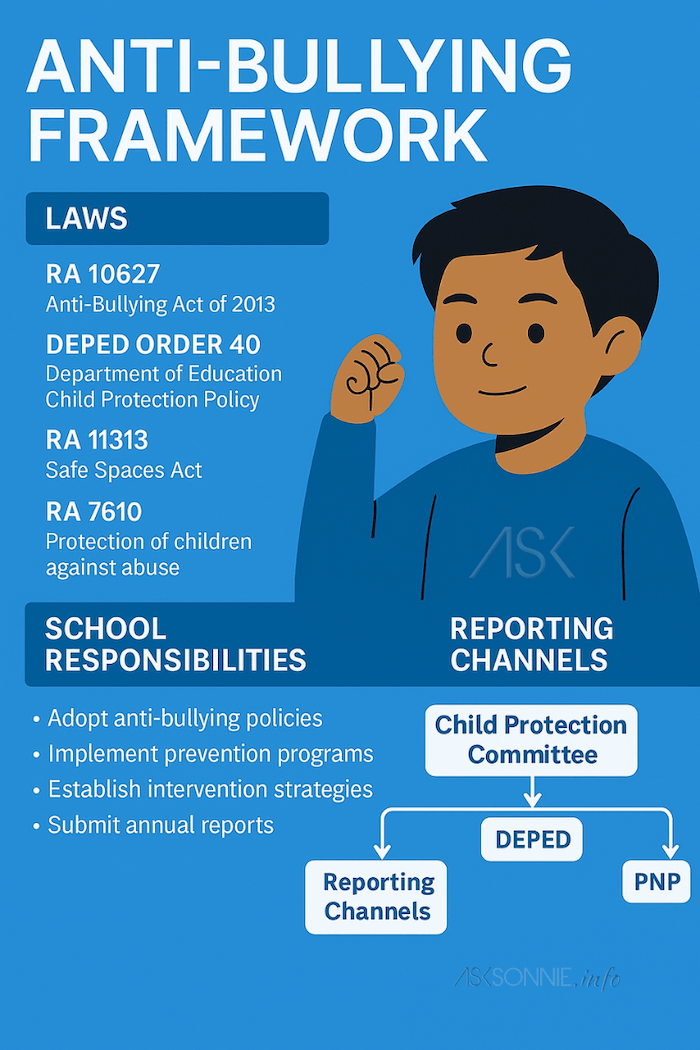Bullying in the Philippines remains a serious concern affecting millions of students both online and offline.
While Filipinos deeply value freedom of speech, we must also protect every child’s right to safe spaces and mental wellness.
This guide explains how Philippine laws and DepEd policies uphold both expression and protection in the digital age.
Understanding Bullying in the Philippine Context
Updated: November 2025
Bullying is defined under Republic Act 10627 – The Anti-Bullying Act of 2013 as any severe or repeated act—verbal, written, physical, or electronic—that causes fear, emotional harm, property damage, or disrupts a student’s education.
This is strengthened by DepEd Order No. 40 s. 2012, which requires every school to form a Child Protection Committee (CPC) and establish mechanisms for reporting, intervention, and rehabilitation.
📊 Bullying: Key Facts
– 6 in 10 Filipino teens said they were bullied in school.
– 1 in 3 youth experienced online bullying (UNICEF, 2019).

Bullying and Free Speech: Striking a Balance
Filipinos take pride in free expression—protected under Article III, Section 4 of the Constitution—but this right ends when it infringes on another’s safety or dignity.
Key Legal References:
- RA 11313 – Safe Spaces Act
- RA 7610 – Protection of Children Against Abuse and Exploitation
- RA 10175 – Cybercrime Prevention Act
ASK Perspective on Bullying:
Freedom of speech is not freedom to harm. Responsible speech builds psychological safety—the foundation of digital wellness.
What Schools Must Do Under the Law
Under RA 10627 and DepEd Order 40, all public and private schools must:
- Adopt policies against bullying on campus and online.
- Set clear disciplinary and rehabilitation processes.
- Implement confidential reporting and investigation systems.
- Offer counseling and parent education on bullying dynamics.
- Submit annual compliance and case data to DepEd.
📘 Learn more at the DepEd Child Protection Portal.
When Teachers Are Bullied
Digital harassment is no longer confined to learners—teachers are now targets of online ridicule and public shaming, a phenomenon called
Cyberbaiting.
While DepEd Order No. 40 s. 2012 – Child Protection Policy focuses on safeguarding learners from abuse and bullying, it does not explicitly cover teachers as victims.
However, educators are protected under several national laws and administrative issuances:
| Legal Basis | Coverage / Purpose | Live Link |
|---|---|---|
| RA 4670 – Magna Carta for Public School Teachers (1966) | Ensures dignity, safe working conditions, and due process before disciplinary action. | lawphil.net/statutes/repacts/ra1966/ra_4670_1966.html |
| RA 11313 – Safe Spaces Act (2019) | Protects individuals—including teachers—from gender-based and online harassment. | lawphil.net/statutes/repacts/ra2019/ra_11313_2019.html |
| RA 10175 – Cybercrime Prevention Act (2012) | Penalizes cyber libel, cyber harassment, and online abuse toward any person. | lawphil.net/statutes/repacts/ra2012/ra_10175_2012.html |
| CSC Memorandum Circular No. 19 s. 1999 | Protects government workers from workplace harassment, intimidation, and verbal abuse. | csc.gov.ph/resources/mc-1999-19.html |
| DepEd Order No. 49 s. 2006 – Code of Ethics for Professional Teachers | Guides ethical conduct; violations against teachers may lead to administrative action. | deped.gov.ph/2006/08/31/do-49-s-2006-code-of-ethics-for-professional-teachers |
🛡 Key Takeaway:
Teachers deserve psychological safety and professional respect—safe spaces must protect both mentors and learners.
Teachers deserve psychological safety too—safe spaces must protect both mentors and learners.
Legal Remedies and Where to Report
| Concern | Where to Report |
|---|---|
| School-related bullying | Child Protection Committee / Principal → DepEd Division Office |
| Criminal or severe cases | PNP Women & Children Desk or NBI Cybercrime Division |
| Online harassment | Cybercrime Investigation and Coordinating Center (CICC) or eSafety.gov.ph |
| Child abuse or exploitation | DSWD Hotline 1343 or Barangay BCPC |
🧭 See related post: Seven To Dos When Cyberbullied.
Empowering Families and Communities
Parents and guardians play a vital role in detection and intervention. Here’s how:
- Maintain open, judgment-free communication.
- Teach empathy and respect online and offline.
- Monitor social media habits with trust, not fear.
- Model digital responsibility and emotional control.
Read: Blended Learning: How to Keep Your Kids Safe Online.
✅ ASK Takeaway
| ASK Pillar | Action |
|---|---|
| Align | Protect both free speech and safe spaces—rights are mutual, not exclusive. |
| Strengthen | Build digital empathy and resilience through education and family dialogue. |
| Kickstart | Champion local campaigns for online kindness and accountability. |
❓ Frequently Asked Questions
What is the legal definition of bullying in the Philippines?
Bullying is defined by RA 10627 as any severe or repeated written, verbal, physical, or electronic act that causes fear, emotional harm, or disrupts education.
How can students or parents report bullying?
Reports can be filed through the school’s Child Protection Committee and escalated to the DepEd Division Office or local authorities if necessary. Anonymous reporting is allowed.
Is cyberbullying covered by the Anti-Bullying Act?
Yes. Section 2(d) of RA 10627 includes acts “through the use of technology or any electronic means.” See also RA 10175 for criminal cyber harassment.
Can free speech justify online insults or harassment?
No. While expression is constitutionally protected, RA 11313 and RA 10175 penalize speech that causes harm, discrimination, or public humiliation.
Are teachers protected from student or parent bullying?
Yes. DepEd Order 40 and the Safe Spaces Act extend protection to teachers from digital or verbal abuse.
Where can victims find counseling or mental health support?
Victims can reach NCMH Hotline 1553 or contact local DSWD offices and school guidance counselors.
💡 The ASK Takeaway
Protecting children from bullying and online abuse is an essential part of Cyber Wellness — a cause aligned with our ASK Framework: Align • Strengthen • Kickstart.
- Align your values with the human rights principle of safe spaces for every learner — online or offline.
- Strengthen community action by promoting empathy, accountability, and mental wellness education in schools.
- Kickstart local initiatives that equip students, parents, and teachers to recognize and respond to cyberbullying.
Continue your learning →
Cyber Wellness in the Philippines (2025 Cornerstone)





